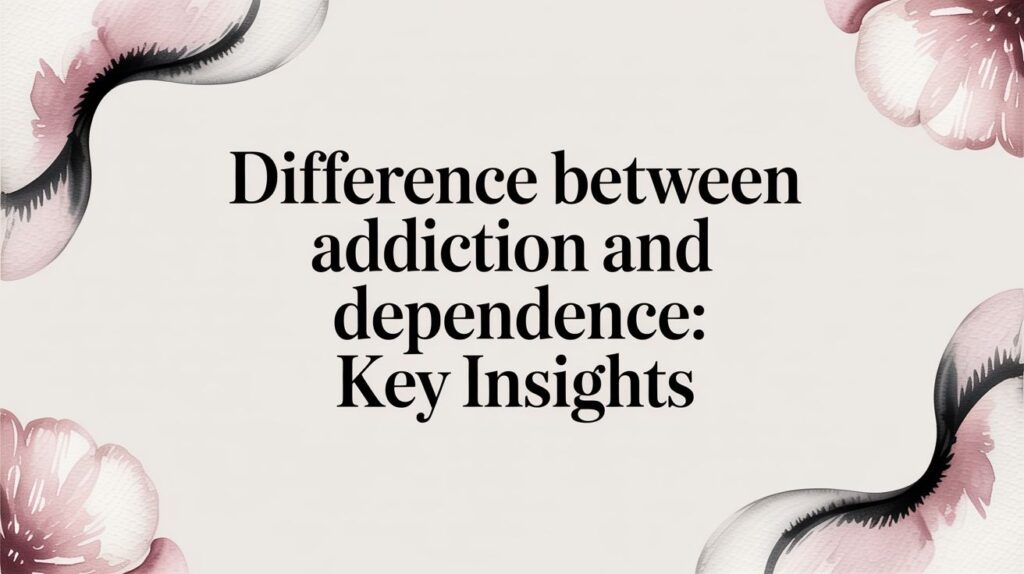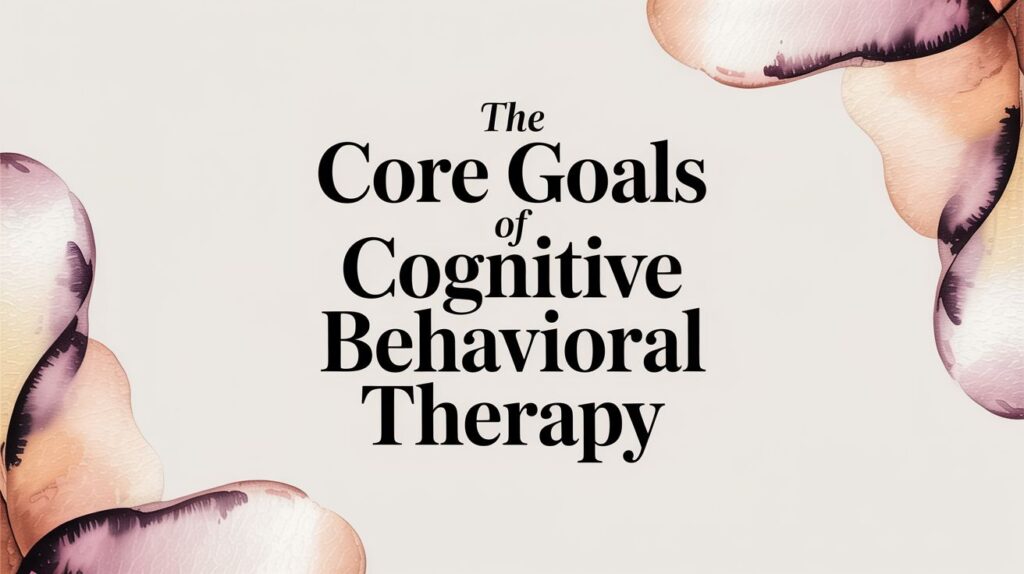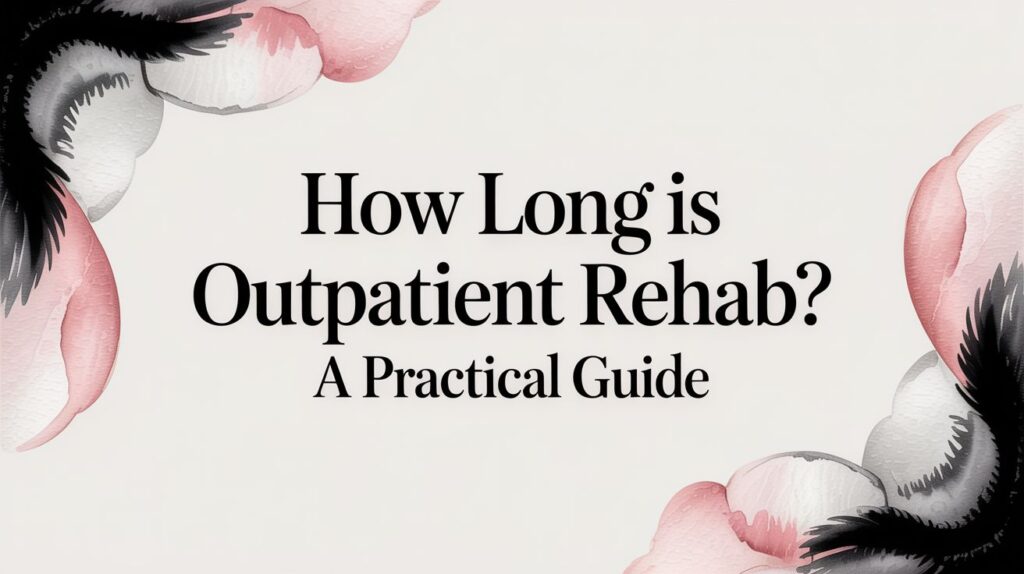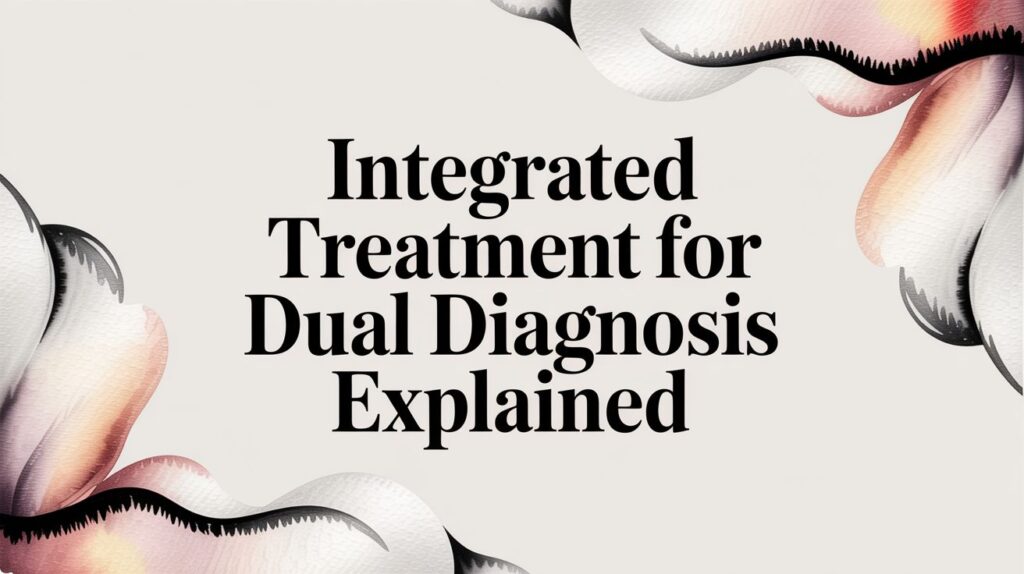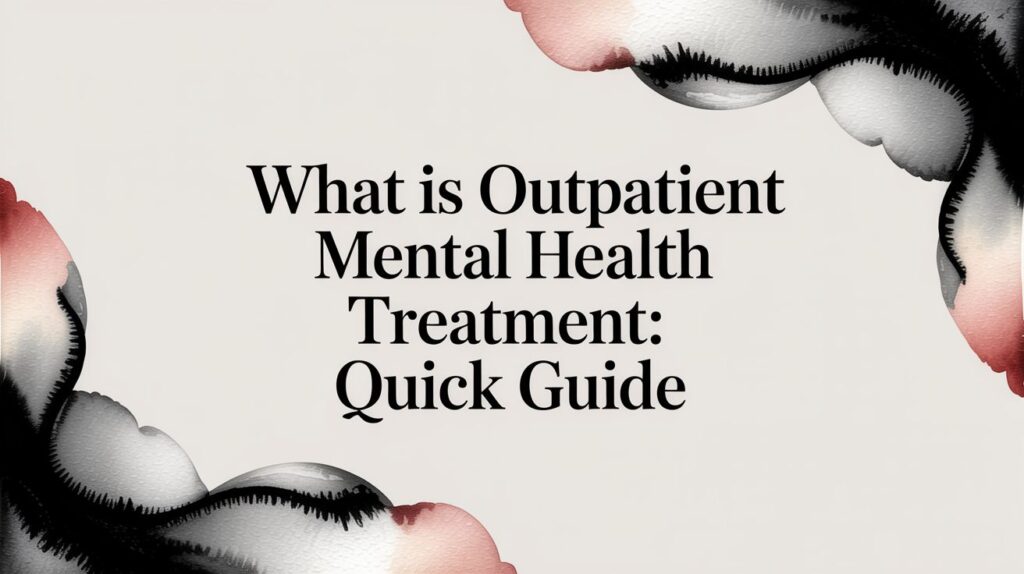The short answer to "can you drink alcohol on Adderall?" is a definitive no. Medical experts are unanimous on this one: combining a powerful central nervous system stimulant with a potent depressant is an incredibly unsafe bet.
It’s not just a matter of one substance canceling the other out. When you mix them, you're creating a dangerous tug-of-war inside your body that can lead to severe, sometimes irreversible, health consequences.
Why Mixing Adderall and Alcohol Is So Dangerous
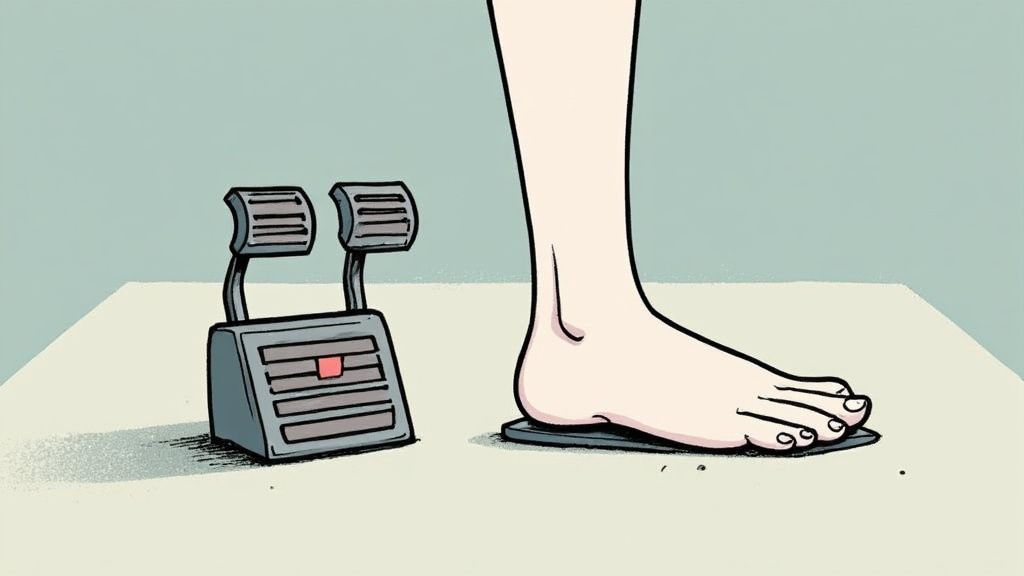
Think of your central nervous system like a car. Adderall floors the gas pedal—ramping up your heart rate, blood pressure, and alertness. Alcohol, on the other hand, slams on the brakes, slowing everything down. When you do both at the same time, you're sending contradictory, high-stress signals to your heart, brain, and other vital organs.
This internal battle has very real consequences. The stimulant effects of Adderall can completely hide the usual signs that you’ve had too much to drink, like drowsiness, slurred speech, or poor coordination. This masking effect is dangerously deceptive, fooling you into believing you’re far more sober than you actually are.
At-a-Glance Risks of Combining Adderall and Alcohol
This false sense of alertness often leads people to drink way more than their body can handle, which dramatically increases the risk of acute alcohol poisoning—a life-threatening emergency.
For anyone who finds themselves using one substance to manage the effects of another, understanding the road to recovery is a critical first step. You can learn more about available treatment options by exploring our guide on what is rehab.
To make the dangers crystal clear, here’s a quick summary of what’s happening inside your body when these two substances clash.
| Risk Category | Description of Danger |
|---|---|
| Masked Intoxication | Adderall's stimulant effects hide the sedative effects of alcohol, leading to excessive drinking and a much higher risk of alcohol poisoning. |
| Cardiovascular Strain | The conflicting signals put extreme stress on the heart, increasing the risk of irregular heartbeats, high blood pressure, and other cardiac events. |
| Impaired Judgment | While you might feel alert, your cognitive judgment remains severely impaired, increasing the likelihood of engaging in risky behaviors like driving. |
| Increased Addiction Risk | Using one substance to counteract the effects of another can create a dangerous cycle of dependence on both Adderall and alcohol. |
Ultimately, the perceived "benefits" of mixing Adderall and alcohol—like being able to party longer—are completely overshadowed by the severe and immediate risks to your health.
How Your Body Handles Adderall and Alcohol Together
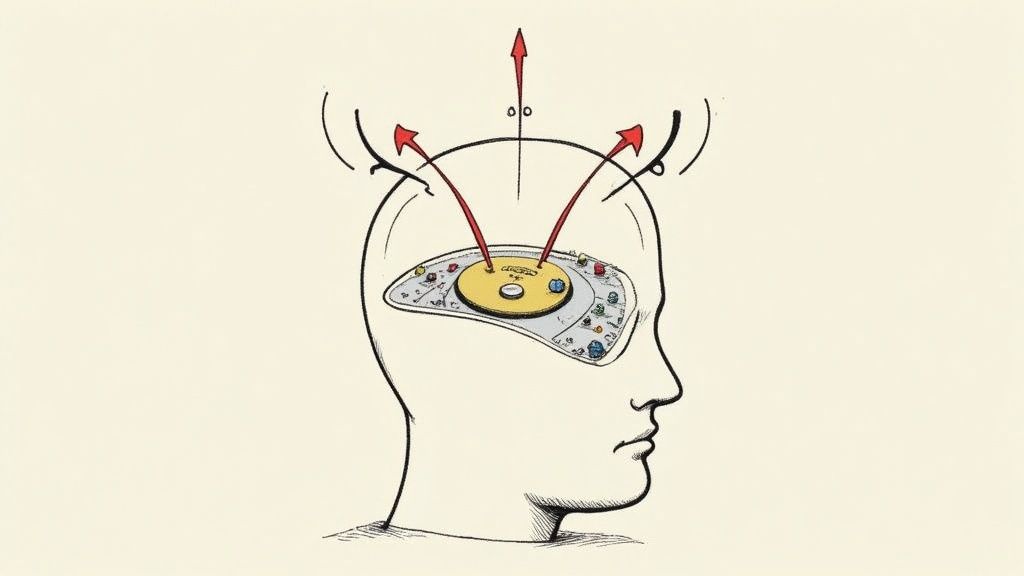
Think of your central nervous system as the cockpit of an airplane. Adderall, a powerful stimulant, is slamming the throttle forward, pushing for more speed, altitude, and alertness. At the same time, alcohol, a depressant, is trying to pull the landing gear down and cut power to the engines.
When you mix the two, you’re not simply canceling one out. You're sending your body wildly conflicting commands, creating an intense internal tug-of-war. Your brain, heart, and vital organs are caught right in the middle of this physiological chaos.
The Deceptive Masking Effect
The most immediate and dangerous part of this combination is the masking effect. The stimulant kick from Adderall can completely hide the usual signs that you’re getting drunk. You don’t feel the sleepiness, the loss of coordination, or the slurred speech that normally acts as your body’s natural brake pedal.
This creates a massive, high-stakes disconnect between how intoxicated you feel versus how intoxicated you actually are.
You might feel sharp, energetic, and perfectly in control, which tricks you into drinking far more than your body can safely handle. Your brain isn’t getting the warning bells, but your blood alcohol concentration (BAC) just keeps climbing into the danger zone.
This false sense of sobriety is precisely why this mix is so tightly linked to episodes of binge drinking and its most severe outcomes.
The Overwhelming Risk of Alcohol Poisoning
Because Adderall is masking alcohol’s sedative punch, it becomes shockingly easy to consume a life-threatening amount before you even realize something is wrong. The stimulation temporarily holds back the depressant effects, allowing your BAC to spike to toxic levels without any of the usual red flags.
This pharmacological showdown dramatically elevates the risk of acute alcohol poisoning—a full-blown medical emergency. In fact, clinical reports show a clear rise in these cases among people who use stimulants and alcohol together. You can learn more about these dangerous interactions between Adderall and alcohol on ColumbusRecoveryCenter.com.
The signs of alcohol poisoning can hit suddenly and are severe:
- Confusion or complete stupor
- Vomiting and seizures
- Breathing that is slow or irregular
- Skin that becomes pale or bluish, with a low body temperature
- Losing consciousness
Ultimately, when you drink on Adderall, you’re disabling your body’s built-in alarm system. That temporary feeling of being able to "handle your liquor" better than usual is a dangerous illusion. It conceals a rapidly escalating threat to your health and safety as your body strains under the pressure of those unsustainable, mixed signals.
The Serious Cardiovascular Dangers of Mixing
Beyond simply hiding how intoxicated you feel, mixing Adderall and alcohol puts a massive, direct strain on your heart. Think of your cardiovascular system getting caught in a tug-of-war it can't win.
Adderall, a stimulant, is pulling in one direction, telling your heart to beat faster and your blood pressure to climb. At the same time, alcohol, a depressant, is yanking the other way, sending confusing and contradictory signals.
This isn't just stressful for your heart—it's dangerous. Your heart is forced to operate under these chaotic conditions, a physiological conflict that can easily trigger severe cardiac events, especially if you have a known or even an undiagnosed heart condition.
A Recipe for Cardiac Distress
The real danger comes from how these opposing forces throw your heart's normal rhythm into disarray. Adderall fires up the sympathetic nervous system, essentially flooring the accelerator. Alcohol, meanwhile, tries to pump the brakes, creating an unpredictable and high-stress internal environment.
This clash is known to create heightened cellular stress inside the heart muscle itself. Research into the effects of drinking on Adderall consistently shows this combination leads to dangerous cardiac strain and confuses the body's internal signaling.
This infographic breaks down exactly how the risks multiply when the two are combined.
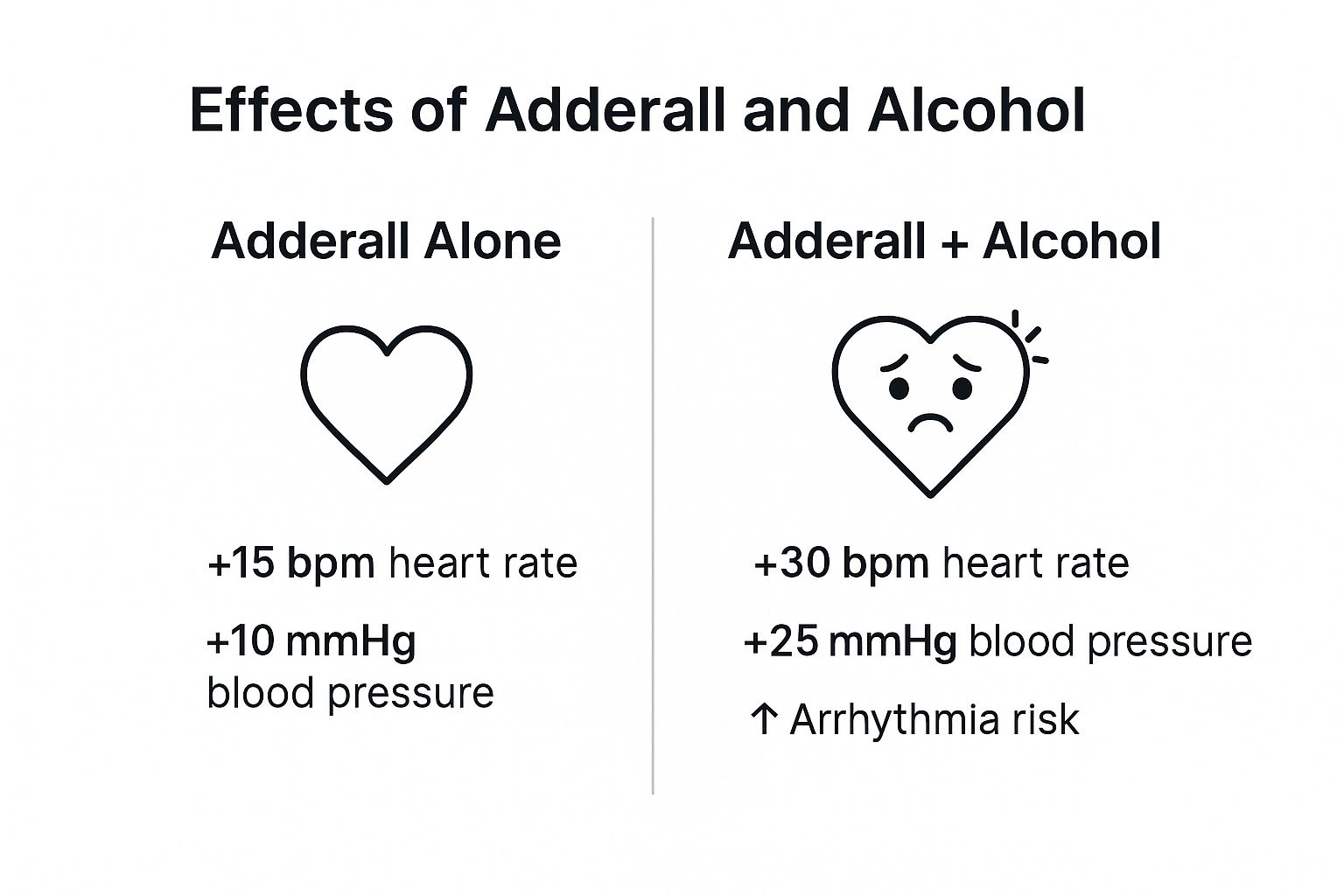
As you can see, the combined hit to your heart rate and blood pressure is far greater than the effect of Adderall alone. This dramatically increases your heart's workload, forcing it to pump against overwhelming resistance.
The table below offers a clearer look at how these substances impact your heart, both alone and together.
Cardiovascular Effects Adderall vs Alcohol vs Combination
| Substance | Effect on Heart Rate | Effect on Blood Pressure | Overall Cardiac Risk |
|---|---|---|---|
| Adderall (Stimulant) | Increases significantly | Increases significantly | Moderate to High (dose-dependent) |
| Alcohol (Depressant) | Can increase or decrease | Can increase or decrease | Moderate (especially with heavy use) |
| Combination | Severely increases and becomes erratic | Dangerously elevates | Very High (synergistic, unpredictable) |
The key takeaway here is the synergistic effect. The combined impact isn't just additive; it's exponential, creating a level of cardiac stress that neither substance produces on its own.
Amplified Risks and Long-Term Damage
When your heart is pushed this hard, several life-threatening issues can pop up. The risk of cardiac arrhythmia—an irregular heartbeat—spikes dramatically. This might feel like a flutter in your chest or a racing pulse, but it can lead to far more serious problems like stroke or even heart failure.
Beyond the immediate danger, repeated co-use can pave the way for chronic cardiovascular problems. This mixture can make you more vulnerable to long-term issues, including conditions associated with drugs that cause QT prolongation and other heart risks.
The core takeaway is that the cardiovascular risks of mixing Adderall and alcohol don't simply add up—they multiply. Each substance amplifies the dangers of the other, putting your heart under a level of stress it was never designed to handle.
Ultimately, asking "can you drink alcohol on Adderall" from a heart-health perspective has a very clear answer. The combination creates a perfect storm for cardiac distress, turning a manageable risk from one substance into a potentially fatal event. Protecting your heart means keeping these two far, far apart.
The Hidden Impact on Your Mental Health and Behavior
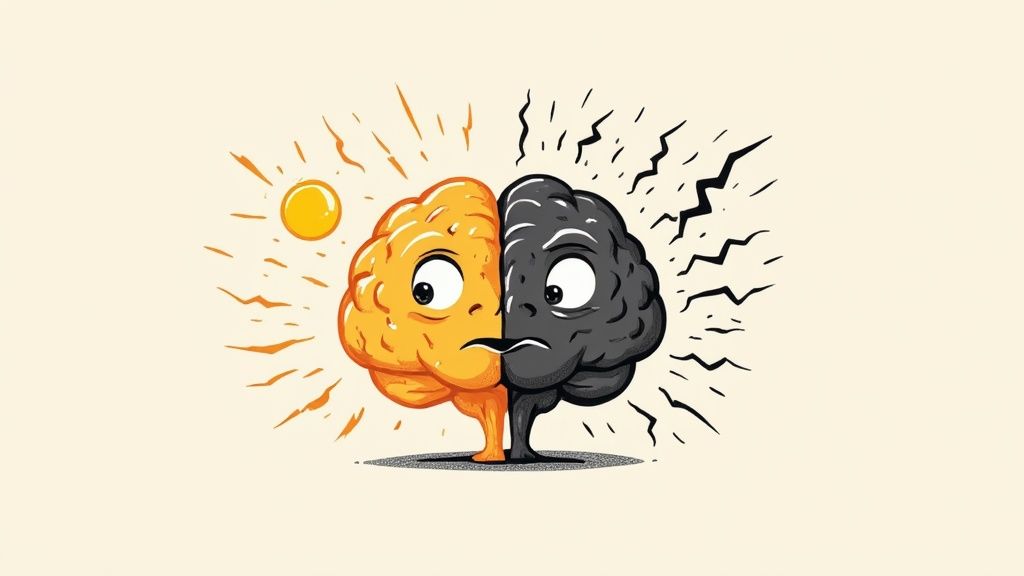
While the heart risks are serious, the psychological fallout from mixing Adderall and alcohol can be just as devastating. This combination kicks off a neurochemical storm in your brain, directly slamming your mood, behavior, and decision-making in ways you can't predict.
At first, you might feel more outgoing, confident, or sociable. But this boost is a trap, often serving as a prelude to significant emotional instability as the two substances go to war in your brain.
This internal conflict can dramatically amplify whatever emotions are already simmering under the surface. Someone who gets irritated easily might become aggressive, while a person with mild anxiety could suddenly be dealing with intense panic or paranoia.
Worsening Existing Mental Health Conditions
For many people with ADHD, co-occurring conditions like anxiety and depression are part of the daily landscape. Tossing alcohol into an Adderall regimen is like pouring gasoline on that fire, making the symptoms of these disorders much worse and far harder to manage.
The real danger is the cycle it creates: the stimulant masks the depressant, which leads to severely impaired judgment. This means you’re not just feeling unstable; you’re also far more likely to make impulsive, high-risk decisions that can have lasting consequences.
The impact isn't just about a bad night or a rough morning. It actively sabotages the therapeutic benefits of Adderall, often causing a nosedive in focus and a spike in impulsivity—the very symptoms the medication is supposed to treat.
For anyone navigating these tangled issues, specialized care is a must. Exploring options like dual diagnosis outpatient treatment provides the kind of integrated support needed to tackle both substance use and mental health at the same time.
The Behavioral Fallout
The behavioral consequences ripple out long after a single night. Because the combination has such a powerful effect on judgment, it can pave the way for a whole range of risky behaviors, including:
- Aggression and Hostility: Uncharacteristic outbursts of anger are common as irritability gets supercharged.
- Impulsive Actions: Snap decisions about money, relationships, or personal safety are made with zero foresight.
- Reckless Behavior: Activities like driving under the influence become much more likely due to a dangerous, false sense of sobriety.
It's also crucial to understand the unique challenges and the silent struggle of anxiety in young men, as underlying mental health issues are often a major driver of risky substance use. So, when you ask, "can you drink alcohol on Adderall," the answer has to account for these profound psychological risks. The combination doesn't just put your body in harm's way; it destabilizes your mental well-being and hijacks your ability to make safe choices.
The Fast Track to Addiction and Dependence
Beyond the immediate physical dangers, mixing Adderall and alcohol creates a dangerously smooth path to dependence. The combination easily traps people in a powerful cycle of polysubstance use, where one drug is used to manage the side effects of the other.
Think of it this way: Adderall, a stimulant, effectively puts a muzzle on the sedative feelings of being drunk. This often leads someone to drink far more than they normally would, chasing that familiar buzz without feeling tired. On the flip side, a person might take more Adderall to fight off the sluggishness from alcohol, letting them stay awake and drink for much longer periods.
This back-and-forth is a recipe for disaster. Using one drug to cancel out the effects of another starts to rewire the brain's reward circuits, conditioning it to crave both substances. This dynamic dramatically increases the odds of developing a substance use disorder involving both Adderall and alcohol.
The Cycle of Polysubstance Use
The U.S. Drug Enforcement Administration classifies Adderall as a Schedule II controlled substance for a good reason—it carries a high potential for abuse and can lead to severe dependence. When you throw alcohol into the mix, that inherent risk gets supercharged.
This pattern of co-use is disturbingly common, especially among young adults. Research has shown that nonmedical use of prescription stimulants like Adderall often goes hand-in-hand with higher-risk behaviors, including heavier drinking. This behavior substantially raises the danger of developing a substance use disorder. You can learn more about the public health risks on GreenHouseTreatment.com.
This dangerous cycle often unfolds like this:
- Chasing a Feeling: Using Adderall to party longer and drink more.
- Managing the Crash: Using alcohol to "come down" from the intense stimulation of Adderall.
- Escalating Doses: Needing more of both substances over time to get the same effects.
This pattern isn't just a bad habit; it's a direct route to physical and psychological dependence. The brain adapts to the presence of both drugs, and functioning without them becomes increasingly difficult, leading to withdrawal and intense cravings.
Breaking free from this cycle is incredibly challenging and usually requires professional support. For anyone caught in this pattern, it’s critical to know that help is available. You might be interested in learning about what is medication-assisted treatment, as it's one of the effective options that can support recovery. When you’re weighing whether you can drink alcohol on Adderall, the long-term addiction potential is just as critical to consider as the immediate health risks.
Expert Medical Guidance and Safer Alternatives
When you get down to it, the expert medical consensus is refreshingly direct: the only truly safe way to take Adderall is to completely avoid alcohol. It’s not about finding a magic waiting period or a “safe” number of drinks. The answer to the question "can you drink alcohol on Adderall" is a hard no if you're prioritizing your health.
This all starts with open, honest communication. It’s absolutely essential to talk to your prescribing doctor about your real-world lifestyle, and that includes your habits around alcohol. They can give you personalized advice based on your specific health profile, dosage, and medical history, making sure your treatment plan works without putting you in harm’s way.
Navigating Accidental Exposure
Mistakes happen. If you or someone you know accidentally combines Adderall and alcohol and starts feeling unwell, knowing what to do is critical. You have to act fast and take any concerning symptoms seriously.
Be on high alert for any of these emergency signs:
- Severe chest pain or a heart that’s racing or beating irregularly
- Shortness of breath or finding it hard to breathe
- Seizures or shaking you can’t control
- Intense confusion, paranoia, or hallucinations
- Losing consciousness or not being able to be woken up
If any of these symptoms show up, don’t second-guess it. Call 911 immediately. Because Adderall masks the usual signs of being drunk, a person can be in critical danger from alcohol poisoning without ever looking sloppy or intoxicated.
Building Healthier Habits
For anyone who finds it tough to skip drinking while managing their ADHD, the key is to develop new strategies. Building a solid foundation of positive behaviors is a huge part of long-term wellness. If you're looking for support, learning about effective coping skills for substance abuse can offer real-world, actionable ways to handle social events and manage cravings without risking your health.
Ultimately, your well-being comes down to making smart choices in partnership with your doctor. Steering clear of this dangerous combination is the single most responsible step you can take for your physical and mental health.
Of course. Here is the rewritten section, crafted to sound completely human-written and natural, following the provided style guide.
Your Top Questions About Mixing Adderall and Alcohol
Even when you understand the big-picture risks, practical questions always pop up. Let’s get straight to the point with clear answers to the most common things people ask about mixing these two substances. The core message here is all about keeping you safe.
How Long After Taking Adderall Can I Drink?
There’s no magic number or universally “safe” waiting period, which is why the overwhelming medical advice is to avoid alcohol completely on any day you take Adderall. You might hear people suggest waiting 6-8 hours for an immediate-release dose or over 12 for an extended-release one, but that advice only slightly dials down the danger.
The truth is, even after the focus and energy have faded, the drug is still active in your system. It’s still putting a strain on your cardiovascular system and messing with your judgment. The only person who can give you truly personalized advice is your doctor, who knows your specific dosage and health profile.
Is It Really That Bad to Have Just One Drink?
Yes, unfortunately, even a single drink can kick off a risky interaction. While the danger definitely climbs with every additional drink, one beer or glass of wine is enough to start raising your heart rate, spiking your blood pressure, and masking how intoxicated you’re actually becoming.
For anyone with an underlying heart condition—and many people don’t even know they have one—that small amount of alcohol could be enough to trigger a serious cardiac event. When you’re trying to figure out if you can drink alcohol on Adderall, no amount is considered truly risk-free.
The safest choice is always to just skip the drink. The interaction is so unpredictable that even one is a gamble with your health.
What Are the Emergency Signs of a Bad Reaction?
You need to seek immediate medical help by calling 911 if you or someone else shows any of these symptoms after mixing Adderall and alcohol:
- Chest pain, a racing or fluttering heartbeat, or shortness of breath
- Seizures or uncontrollable shaking
- An unusually high body temperature (feeling extremely hot to the touch)
- A severe headache, intense confusion, or paranoia
- Losing consciousness or being unresponsive
Remember, because Adderall masks the usual signs of being drunk, a person could be in serious danger from alcohol poisoning without slurring their words or stumbling. Always treat any severe or strange symptom as a medical emergency.
Can I Drink Non-Alcoholic Beer on Adderall?
Generally, yes. Non-alcoholic (NA) beers, which legally must contain less than 0.5% alcohol by volume (ABV), are highly unlikely to cause a significant interaction. They can be a much safer way to feel included in social situations where everyone else is drinking.
That said, it’s always smart to double-check the label to confirm you've got a true 0.0% or <0.5% ABV beverage. If you have any worries at all, a quick chat with your doctor is the best way to get peace of mind.
If you’re finding it hard to manage your use of Adderall and alcohol and are concerned about the risks, please know that professional help is available. At Altura Recovery, we offer compassionate, evidence-based outpatient programs designed to help you build a solid foundation for recovery while still managing your daily life. Learn more about our approach and start your journey to healing today.


